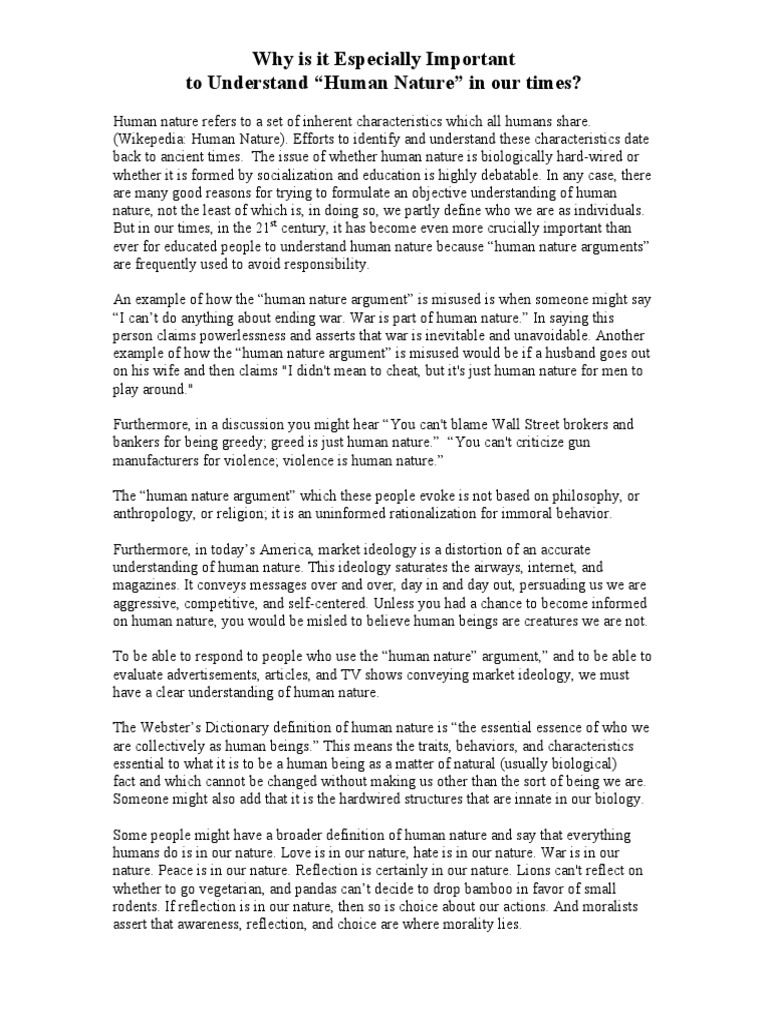The Bahá’í teachings emphasize the profound interconnectedness of all humanity, a principle that invites individuals to understand human nature through the lens of oneness. This framework fosters a holistic view, enriching our comprehension of self and society. In a world fragmented by disparities, the tenets of unity underscore the importance of transcending individualistic perspectives. Through this exploration, readers are invited to reconsider their engagement with one another and the broader society.
At the heart of Bahá’í philosophy is the declaration that humanity is one family. This assertion necessitates an examination of the psychological, sociological, and spiritual dimensions of human nature—an endeavor that requires us to look beyond superficial distinctions. The concept of oneness posits that every individual possesses an intrinsic value and potential, inherently linked to the fabric of humanity itself. Hence, understanding human nature entails recognizing the common threads that bind us together, fostering empathy and compassion.
One cannot undervalue the implication of this oneness in our daily engagements. Traditional paradigms of identity often emphasize divisions—be they racial, cultural, or ideological. However, the Bahá’í teachings advocate for a transformative approach in which individuals recognize their shared humanity as the foundation for interaction. This paradigm shift not only alters personal relationships but also influences broader societal constructs, encouraging a more inclusive global community.
The Bahá’í writings articulate that the acknowledgment of unity leads to the eradication of prejudice—a crucial barrier to understanding and connection. Prejudice, in its myriad forms, can distort our perception of others, blinding us to their innate dignity. By cultivating an awareness of our interconnectedness, we can dismantle these biases and experience deeper, more meaningful interactions. This process often begins with introspection, as individuals grapple with their own preconceived notions and societal conditioning.
Moreover, the Bahá’í teachings assert that the cultivation of community is vital in the journey toward achieving unity. Community, as viewed through this lens, becomes a crucible for the development of human virtues. Within such an environment, individuals are encouraged to express their unique talents while simultaneously contributing to the collective welfare. It is in these shared spaces that the essence of oneness materializes, enabling the flourishing of both individual and communal identities.
Another significant aspect of understanding human nature through the lens of oneness is the notion of service. The Bahá’í writings elucidate a direct correlation between service to humanity and the realization of one’s purpose. Engaging in acts of service cultivates a profound understanding of others, breaking down barriers and fostering cooperation. Service acts as a bridge, allowing individuals to not only contribute to their communities but also to realize their interconnectedness.
An exploration of the concept of oneness inevitably leads to the realization that spiritual development is inextricably linked to human relationships. The Bahá’í teachings emphasize the importance of cultivating virtues such as love, compassion, and patience—traits that are essential in nurturing harmonious interactions. When individuals strive for personal spiritual growth, they inherently contribute to the overall betterment of society, illustrating the reciprocal relationship between personal development and communal harmony.
Within the framework of oneness, the acceptance of diversity emerges as a pivotal component. The Bahá’í perspective celebrates the richness of varied cultural and social backgrounds, seeing them as essential to the tapestry of human experience. Rather than diminishing the concept of unity, diversity enriches it, presenting opportunities for learning and growth. The challenge lies in embracing these differences wholeheartedly, acknowledging that they enhance our collective identity rather than detract from it.
Furthermore, the teachings emphasize the necessity of engaging in constructive dialogue. Open communication serves as a vehicle for understanding, allowing individuals to share perspectives and foster mutual respect. It is within these dialogues that the nuances of human nature can be explored, leading to a deeper appreciation for the breadth of human experience. The Bahá’í view promotes the idea that through genuine conversation, individuals can overcome divisions and cultivate a shared vision for the future.
The practice of patience emerges as a catalyst in the pursuit of understanding human nature through oneness. Patience allows for the navigation of conflicts and misunderstandings, fostering an environment where healing can occur. The Bahá’í teachings hold that in overcoming challenges, individuals must cultivate resilience and empathy—elements that are critical for nurturing lasting relationships and fostering community resilience.
Ultimately, the teachings of the Bahá’í faith present an invitation to embark on a journey of discovery regarding our shared human experience. This journey requires courage and a willingness to engage with the complexities of human nature. The pursuit of oneness necessitates the dismantling of barriers, both internal and external, that inhibit our ability to connect authentically with others.
In conclusion, understanding human nature through the prism of oneness is not merely an abstract concept but a transformative process. It promises a shift in perspective—one that emphasizes our shared aspirations and collective responsibilities. By embracing the principles of unity, love, service, and dialogue, individuals can cultivate a deeper understanding of themselves and the world around them. The call for unity resonates as a powerful and essential element in the narrative of human existence. Through this lens, the potential for a more equitable, compassionate, and understanding world is inexorably within reach.
